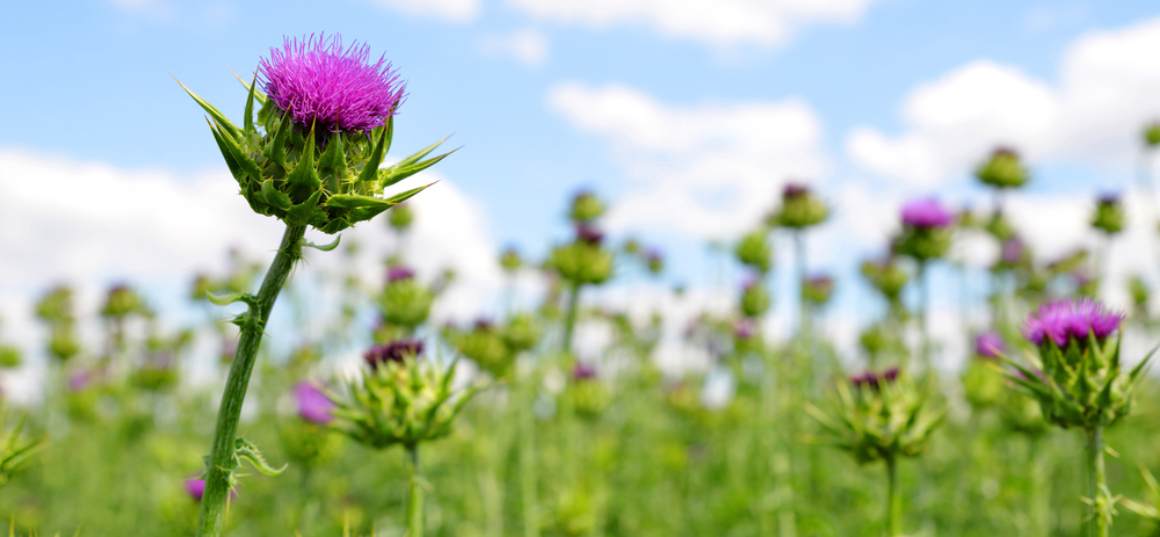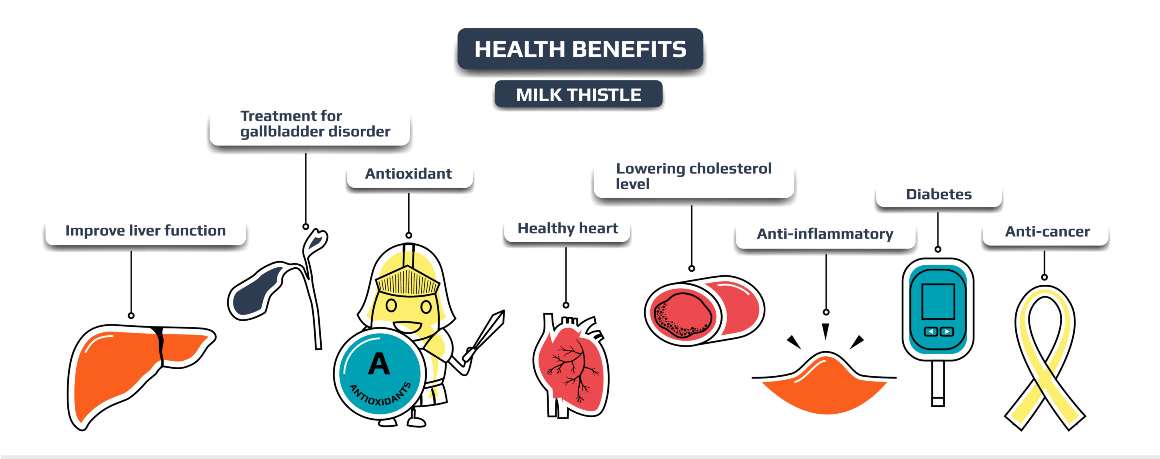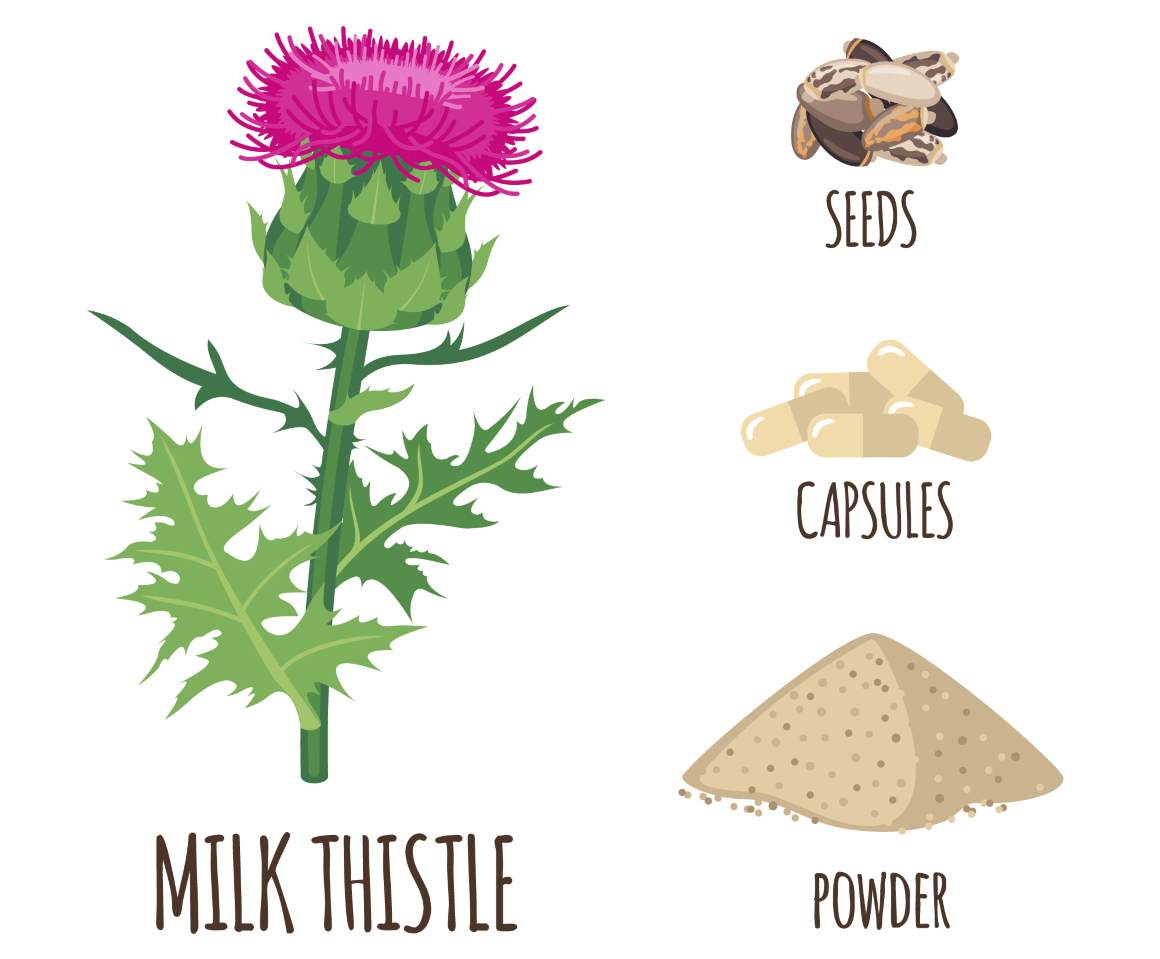Milk Thistle and Liver Health
Published:
Milk thistle, scientifically known as Silybum marianum, has been used for centuries as a herbal remedy to support liver health and address various ailments. Silymarin, the active ingredient of Silybum marianum (milk thistle), is thought to have strong antioxidant and anti-inflammatory properties. In this blog post, we will delve into the potential benefits of milk thistle in promoting liver health, cancer prevention and management, bone health, acne management, and type 2 diabetes control.
Contents:
Furthermore, we will discuss the appropriate dosages of milk thistle for different purposes and populations – including pets like dogs and cats – while highlighting important safety precautions that must be taken when using this supplement. By understanding how milk thistle can contribute to overall wellness through its various applications in modern medicine, you'll be better equipped to make informed decisions about incorporating it into your daily routine or recommending it to others seeking natural remedies for their specific needs.
Milk Thistle and Liver Health
Milk thistle, scientifically known as Silybum marianum, has been used for over two thousand years to treat liver and gallbladder diseases. Its active ingredient, silymarin, is a potent antioxidant that helps protect the liver against toxins such as the death cap mushroom (Amanita phalloides). This herbal remedy is most commonly used to treat viral infections and cirrhosis of the liver. Though some studies suggest milk thistle may benefit certain types of liver diseases, other research suggests its efficacy is inconclusive.

Insufficient Data to Support Milk Thistle as a Definitive Treatment Option
Various studies have suggested that taking milk thistle may be beneficial for people with chronic hepatitis C or alcoholic cirrhosis, yet other investigations show no substantial improvement in these conditions when the supplement is used. According to an analysis by the National Center for Complementary and Integrative Health (NCCIH), there isn't enough high-quality evidence available yet to determine whether milk thistle can effectively treat various forms of liver disease. The NCCIH also states that more rigorous clinical trials are needed before drawing any firm conclusions about its benefits for liver health.
In animal studies, however, milk thistle appears promising in protecting against drug-induced hepatotoxicity (liver damage caused by medications) due to its antioxidant properties. For example, one study found that rats treated with silymarin experienced less acetaminophen-induced toxicity compared to those who didn't receive it (source). While these findings are encouraging, further research involving human subjects is necessary before making definitive recommendations about using milk thistle supplements for preventing or treating medication-related liver damage.
It's important to note that milk thistle is not a substitute for medical treatment, and it should be used under the guidance of a healthcare professional. If you're considering taking milk thistle or any other supplement for liver health, consult your doctor first to discuss potential benefits, risks, and appropriate dosages based on your individual needs.
At this time, there is insufficient data to support the use of milk thistle as a definitive treatment option for liver health. However, additional research has uncovered other potential benefits from taking milk thistle that are worth considering.
Additional Health Benefits of Milk Thistle
Apart from potential benefits for liver health, milk thistle may provide other health advantages. Some of these include protection against bone loss through improved bone mineralization, boosting breast milk production in lactating mothers, reducing acne lesions by regulating hormonal balance, and managing type 2 diabetes complications prevention. Additionally, research indicates that components found within milk thistle have anti-inflammatory effects that can enhance chemotherapy effectiveness against specific cancers.

Protection Against Bone Loss Through Improved Bone Mineralization
Milk thistle has been shown to have a positive impact on bone health. Animal studies suggest that the active ingredients in milk thistle can help protect against bone loss by promoting the formation of new bone cells and inhibiting the activity of cells responsible for breaking down bones. This plant-based remedy could be beneficial for those who are in danger of developing bone fragility or other illnesses related to frail bones.
Boosting Breast Milk Production in Lactating Mothers
Lactating mothers looking to increase their breast milk supply might find relief with milk thistle supplementation. A study conducted on nursing women found that those who took milk thistle supplements experienced an increase in breast milk production, compared to those who did not take any supplement. It is believed that silymarin - one of the active ingredients present in Silybum marianum - is responsible for this effect.
Reducing Acne Lesions by Regulating Hormonal Balance
- Hormone regulation: Research suggests that taking milk thistle may help reduce acne lesions by regulating hormonal balance. Milk thistle appears to have anti-androgenic effects, which means it can block the action of male hormones that contribute to acne development.
- Anti-inflammatory properties: The active ingredient in milk thistle, silymarin, also has potent anti-inflammatory properties. This could further contribute to its ability to reduce acne breakouts and promote healthier skin.
In addition to these benefits, milk thistle has been studied for its potential role in managing type 2 diabetes complications prevention and enhancing chemotherapy effectiveness against specific cancers. Further studies may reveal other ways that milk thistle can contribute to one's health and wellbeing.
For centuries, milk thistle has been utilized to handle a range of afflictions; these new health advantages are only some of its potential applications. Silibinin, an active component in milk thistle extract, may be able to combat hepatitis C virus infection by inhibiting viral replication.
Milk Thistle's Antiviral Properties
Studies suggest that silibinin, a component found in milk thistle, is a potent antiviral agent useful for individuals with chronic hepatitis C who do not respond to pegylated interferon/ribavirin therapy. This highlights the potential therapeutic applications of milk thistle beyond just supporting overall liver health.
Silibinin's Role in Combating Hepatitis C Virus Infection
The active ingredient silibinin, which is derived from the seeds of the Silybum marianum plant, has been shown to possess significant antiviral properties against hepatitis C virus (HCV). Research indicates that silibinin inhibits HCV replication by targeting various stages of the viral life cycle. For instance, it can block viral entry into host cells and prevent new virions' release from infected cells. Additionally, animal studies have demonstrated its ability to reduce liver damage caused by toxins such as amanita phalloides (death cap mushroom).
- Inhibition of Viral Entry: Silibinin appears to interfere with HCV binding and fusion processes on host cell membranes. Silibinin has been found to impede the HCV binding and fusion procedures that are necessary for viral entry into liver cells, thus obstructing its ability to establish an infection.
- Suppression of Viral Replication: Studies show that silibinin may also inhibit essential enzymes required for HCV RNA synthesis within infected cells. As a result, this limits viral replication and reduces overall levels of circulating virus particles.
- Prevention of Viral Release: Silibinin has been found to disrupt the assembly and secretion of new HCV particles from infected cells, further reducing viral spread within the liver.
Taking milk thistle in the form of a liquid extract or supplement containing its active ingredients may help improve treatment outcomes for individuals with chronic hepatitis C who have not responded well to conventional therapies. However, it is essential to consult with a healthcare professional before using milk thistle as an adjunctive therapy for HCV infection. Milk thistle appears to be a promising herbal remedy for liver damage caused by toxins such as the death cap mushroom. It is important to note that milk thistle is not a substitute for medical treatment and should not be used as a primary treatment for any medical condition.
Milk thistle's antiviral properties have been studied extensively, and its silibinin component has shown promise in combating hepatitis C virus infection. Moving on to cancer treatment support with milk thistle, the potential of enhancing chemotherapy effectiveness using components found within this herb is a promising avenue for further research.

Cancer Treatment Support with Milk Thistle
Research indicates that components found within milk thistle have anti-inflammatory effects, which can enhance chemotherapy effectiveness against specific cancers. Milk thistle components have been shown to suppress the secretion of angiogenic cytokines, which can impede cancer cell proliferation. This passage will look at the potential advantages of milk thistle in aiding cancer treatment and its capability to impede tumor development.
Enhancing Chemotherapy Effectiveness Using Milk Thistle Components
Milk thistle contains active ingredients, such as silymarin and silibinin, that demonstrate antioxidant and anti-inflammatory properties. Silymarin and silibinin have the potential to both protect healthy cells from chemotherapy-induced damage while increasing its effectiveness against cancerous ones. For example, a study published in the journal Cancer Letters reported that silibinin sensitized human colorectal carcinoma cells to oxaliplatin-induced apoptosis (cell death), thereby increasing the drug's efficacy.
Milk Thistle's Anti-Angiogenic Potential in Cancer Chemoprevention
Beyond its role in enhancing chemotherapy effectiveness, milk thistle appears to exhibit anti-angiogenic potential. Angiogenesis is the process through which new blood vessels form from pre-existing ones - a crucial factor for tumor growth and metastasis since tumors require an adequate blood supply for survival. By inhibiting angiogenic cytokine secretion, milk thistle may disrupt this process and limit cancer progression.
In animal studies involving mice with prostate or lung cancers treated with silibinin, researchers observed a significant reduction in tumor growth and metastasis. More research is needed to determine the most beneficial dosage and length of time for taking milk thistle as a cancer treatment supplement.
It's essential to consult with your healthcare provider before incorporating milk thistle into your cancer treatment regimen. It is essential to speak with a medical professional before incorporating milk thistle into your cancer treatment plan, as they can offer advice on the suitable dosage.
Milk thistle has been shown to be a promising natural supplement for cancer treatment support, and further research is necessary in order to determine the best dosages and safety considerations. For those looking into milk thistle as an adjunct therapy, it's important to understand appropriate dosages and potential contraindications for certain individuals.
Milk Thistle Dosage and Safety Considerations
Some individuals may experience an allergic reaction when taking milk thistle orally, so caution should be taken by pregnant women, people with diabetes, and those who are allergic to plants from the Asteraceae/Compositae family. Pregnant women, people with diabetes, and those who are allergic to plants from the Asteraceae/Compositae family should exercise caution before using milk thistle as a supplement or treatment. This article will cover dosage info for adults, pets, and possible adverse reactions as well as considerations.
Allergic Reactions and Contraindications for Certain Individuals
Milk thistle can cause gastrointestinal issues such as nausea, diarrhea, bloating, or gas in some cases. It's important to start with a low dose of milk thistle extract to gauge your body's response before increasing the dosage gradually if needed. If you experience any severe side effects like difficulty breathing or swelling of the face, lips, tongue, or throat after taking milk thistle supplements, seek immediate medical attention.
Appropriate Dosages for Adults, Dogs, and Cats
- Adults: The recommended daily dosage of milk thistle for healthy adults varies depending on factors such as age and overall health condition but typically ranges between 150mg - 450mg per day divided into three doses (source). Some studies suggest that taking higher doses up to 600 mg/day may be more effective in treating liver-related conditions; however, always consult your healthcare provider before starting any new supplement regimen.
- Dogs: Milk thistle can also be beneficial for dogs, particularly those with liver issues. The general guideline is to administer 50-200 mg of milk thistle extract per 10 kg (22 lbs) of body weight daily (source). However, it's essential to consult your veterinarian before giving any supplements or medications to your pet.
- Cats: For cats, the recommended dosage is approximately 5mg - 10mg per kg (2.2 lbs) of body weight daily (source). As with dogs, always consult a veterinarian before administering milk thistle or any other supplement to your cat.
In conclusion, while milk thistle appears generally safe and potentially beneficial for various health conditions related to liver function and beyond, it's crucial that individuals considering taking this herbal remedy take into account potential side effects and interactions with other medications. Always seek professional advice from healthcare providers or veterinarians when determining appropriate dosages for yourself or your pets.
Before taking milk thistle, it is essential to consult with a medical expert as the supplement may lead to adverse reactions when combined with certain drugs. Furthermore, understanding the appropriate dosages for adults, dogs and cats should be taken into consideration when using this supplement. Now let's explore frequently asked questions about milk thistle in order to gain further insight on its usage.

Frequently Asked Questions about Milk Thistle
In this section, we address common questions regarding milk thistle usage such as when to take it (morning or night), what medications should not be taken alongside it, how long it takes to lower liver enzymes or detoxify the liver. Our aim is to provide clarity on these topics based on available research findings.
When to Take Milk Thistle for Optimal Results
No clear-cut answer exists as to whether morning or night is the best time for consuming milk thistle. However, some studies suggest that splitting the daily dosage into two parts and consuming them with meals may improve absorption and efficacy of silymarin, an active ingredient found in milk thistle. Ultimately, consistency in timing and following recommended dosages are key factors for obtaining optimal benefits from this herbal remedy.
Medication Interactions with Milk Thistle
Milk thistle appears safe for most people; however, there are certain medications that might interact negatively with this supplement:
- Cytochrome P450 substrates: Milk thistle can affect enzymes responsible for breaking down drugs like statins, antihistamines, and calcium channel blockers. Consult your healthcare provider before combining these medications with milk thistle.
- Raloxifene: This medication used primarily by women at risk of osteoporosis may have reduced effectiveness if taken alongside milk thistle due to potential alterations in its metabolism within the body.
- Tacrolimus: Combining tacrolimus, an immunosuppressant drug, with milk thistle may lead to increased blood levels of the medication and possible side effects. Consult your healthcare provider before using these substances together.
It is essential to consult a healthcare professional before taking milk thistle if you are on any medications or have pre-existing health conditions. For more information about potential interactions between milk thistle and other drugs, visit WebMD's Milk Thistle page.

FAQs in Relation to Milk Thistle
What is the downside of milk thistle?
Milk thistle generally has few side effects, but some people may experience gastrointestinal issues like nausea, diarrhea, or bloating. Additionally, it can interact with certain medications such as blood thinners and allergy drugs. Always consult a healthcare professional before starting any new supplement regimen.
What does milk thistle do to your body?
Milk thistle contains silymarin, which has antioxidant and anti-inflammatory properties that support liver health by protecting liver cells from damage and promoting regeneration. It also helps in managing type 2 diabetes, acne management, bone health improvement and cancer prevention.
Is milk thistle actually good for your liver?
Yes, milk thistle is beneficial for liver health due to its active ingredient silymarin. Silymarin provides antioxidant protection against toxins and free radicals while supporting the growth of new healthy liver cells. However, results may vary depending on individual factors such as medical history or lifestyle choices.
Is it safe to take milk thistle every day?
Generally speaking, daily consumption of milk thistle is considered safe for most individuals when taken within recommended dosages (up to 420 mg/day). However, always consult a healthcare professional before incorporating any supplement into your routine regularly.
Conclusion
Overall, milk thistle appears to have potential benefits for liver health, cancer prevention and management, bone health, acne management, and managing type 2 diabetes. Though the proof is mixed regarding its utility in treating alcoholic liver disease, it could still be of assistance to those receiving toxic chemotherapy for the liver.
When taking milk thistle as a supplement or herbal remedy, it's important to consider dosage and safety precautions. Always consult with a healthcare professional before starting any new supplement regimen.













